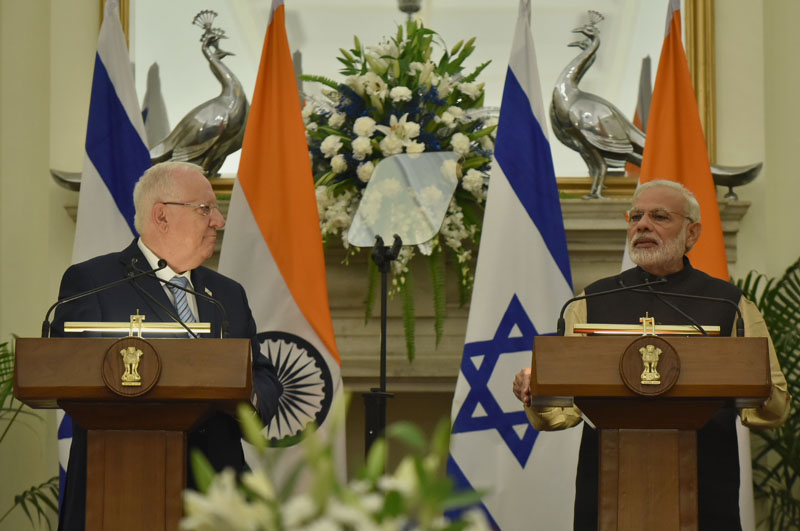By P R Kumaraswamy
Presidential visits, though ceremonial, often communicate a subtle message about the status of bilateral relations, especially when such visits are less frequent and require longer preparations. Hence, there are long gaps between reciprocal presidential visits even among friendly countries. While visits by prime minister signal the continued commitments to furthering bilateral ties, visits by heads of state indicate that the importance India attaches to the country in question and its commitment to improve relations. The same applies to Israel as well.
There has been a pattern in the political contacts with Israel since relations were established in January 1992. There was a larger national consensus when Prime Minister P V Narasimha Rao reversed the four-decade old policy of recognition-without-normalization policy formulated by Jawaharlal Nehru. Political engagements since normalization however, have been less frequent. In quarter of a century, there were three presidential visits, namely, Ezer Weizman (December 1996-January 1997), Pranab Mukherjee (October 2015) and Reuven Rivlin (November 2016) and one by the Prime Minister, namely Ariel Sharon in September 2003.
Since 1992 three External Affairs Ministers visited Israel, namely Jaswant Singh (July 2000), S M Krishna (January 2012) and Sushma Swaraj (January 2016). From Israel Shimon Peres came to India in 1993 as foreign minister and Silvan Shalom visited in February 2004. Likewise, after the visit of L K Advani in July 2000, Rajnath Singh became the second Indian Home Minister to visit Israel in November 2015. The only defense ministerial level exchange took place when Moshe Ya’alon was hosted in February 2015. Indeed, there were also a few visits that did not happen, especially by Prime Minister Yitzhak Rabin in the early 1990s and by President K R Narayanan.
On 16 May 2014 as election results were being announced, Prime Minister Benjamin Netanyahu became the first world leader to congratulate Narendra Modi on his landslide victory and since then there were periodic contacts and exchanges between the two countries. In continuation of his earlier exchanges as the chief minister of Gujarat, Modi has been expressing his warmth towards Israel through meetings during UN General Assembly, Paris Climate Summit or during the funeral of Lee Kwan Yew in Singapore. In the past, such occasions were used for photo-ops with the Palestinian leaders. He has also at times expressed his admiration for the Kibbutz system and for the late David Ben Gurion.
There is an interesting pattern in the bilateral exchanges with Israel. While bilateral relations continued to flourish when the Congress party was in power in the Centre, political contacts were few. If prolonged pro-Palestinian position contributed to Rao’s hesitation for high-level contacts, Manmohan Singh faced a different problem. As Finance Minister Singh represented in India during the funeral of slain Prime Minister Yitzhak Rabin in November 1995 but as prime minister his options were limited by coalition compulsions, especially when the Left Parties were demanding a ‘course correction’ and limited politico-strategic ties with Israel. Thus, it was only during the NDA rule, first
under Prime Minister Atal Behari Vajpayee and now under Modi one could notice visible and—one might add unapologetic—political contacts with Israel.
Seen in this context, Rivlin’s visit indicates the shortened time gap in political contacts between the two countries. The reciprocal visit by the Indian President happened nearly two decade after Weizman’s visit in January 1997 but Rivlin came to India just a year after Mukherjee’s path breaking visit to Israel in October 2015. Both sides wish to avoid too long a gap between political contacts and exchanges.
At the same time, it is essential to remember that the absence of visible political exchanges has not hampered the flow and trajectory of the bilateral relations. In the initial years especially since the late 1990s, military-security ties have become an important component of the bilateral relations with the Ministry of Defense adopting a professional and non-political approach to benefits accruing out of robust cooperation with Israel. Gradually the Ministry of Agriculture emerged as the key driver in furthering the bilateral cooperation with Israel in a host of areas such as agriculture, horticulture floriculture, irrigation and water management, farming techniques, animal husbandry etc.,
Though important, political visits alone are insufficient to further bilateral relations with any country. Most visits by presidents, prime ministers and other leaders from a host of countries to India rarely make it to the front pages and are largely forgotten by the Indian media. Hence, to be relevant there has to be a substantial content to bilateral relations and this is the case with Israel. Quarter of a century after the belated normalization, the relations are on a stable and progressive trajectory and encompass a host of new areas including waste recycling, infrastructure development and above all academic cooperation. Some of these are long-term projects whose outcomes should not be measured in terms of material gains or even by the number of direct beneficiaries. They have the potential to dent the traditional anti-Israeli rhetoric of the Indian elite and urban middle class and the process provide a rural base for robust ties with the Jewish State.
However, for a sustained growth of the bilateral relations periodic high-level contacts become necessary both for signaling the political support for the process and for providing the direction. It is in this context one should view the likely visit of Prime Minister Modi to Israel. Since May 2014 there were widespread speculations of Israel being high on his agenda and the following May External Affairs Minister even announced that the Prime Minister’s visit would take place ‘this year’. Moreover, beginning with his visit to the UAE in August 2015, Modi had visited all the principal countries in the Middle East, namely, Saudi Arabia, Turkey, Iran and Qatar and only Israel is still pending. Most observers feel that his visit to Israel would be the hallmark of the 25th anniversary celebrations of the bilateral relations.


